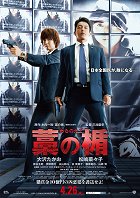Rendező:
Takashi MiikeForgatókönyvíró:
林民夫Operatőr:
北信康Zeneszerző:
Kōji EndōSzereplők:
Nanako Matsushima, Tatsuya Fujiwara, 大沢たかお, Tsutomu Yamazaki, Masayuki Ibu, 岸谷五朗, Kimiko Yo, 永山絢斗, Daikiči Sugawara, Kazuya Takahashi, Kenji Kawahara, 本田博太郎 (több)Tartalmak(1)
"Kill Kunihide Kiyomaru, and I will pay you 1 billion Yen". This is the ad placed in all the main newspapers in Japan. In placing the ad, the powerful multi-billionnaire Ninagawa puts an irresistible price on the head of the man he believes to be his granddaughter's killer. Realising he has become a target for millions of people, Kiyomaru turns himself in at the Fukuoka Police Station. Four officers are dispatched to bring Kiyomaru back to Tokyo, risking their own life, but now any number of assassins lie in wait on the 1.200km journey. The trip becomes a hellish chase, with potential killers at every turn. Will the police get Kiyomaru to Tokyo to face justice, or will justice of a different nature prevail? (forgalmazó hivatalos szövege)
(több)Recenziók (3)
What is more important, the basic legal pillars of society, where everyone has the right to a fair trial, a higher moral principle, which is however not stipulated the law, the inner integrity of each individual or just a giant pile of dust? Yes, difficult and ambiguous ethical and moral dilemma, which is viewed from different perspectives during the footage and Miike constantly forces both character and viewer to take sides. And it's not an "academic discussion over a cup of tea", but a well-paced action thriller packed with action. Back then, Nolan tried to do something similar in the Dark Knight for a few minutes, but only here is finally "did the job". And as if that wasn't enough, it also works on the third level as a psycho (logical) insight into a closed group, which is under enormous pressure because they can not trust anyone from the outside and not even each other. It is simply Miike's idea of a "normal" blockbuster.
()
After seeing Miike’s new film, one could almost say that the situation with Japanese cinema looks very good. After all, we would be hard pressed to find anywhere else the equivalent of a star-studded, big-budget blockbuster in which the main attraction isn’t action and plot twists, but rather ethical issues that get under the skin of viewers. Furthermore, the film ranked among the year’s fifteen top-grossing domestic films. But on closer inspection, it becomes apparent that everything is unfortunately still how it was before. The Japanese film industry suffered for years from a lack of original ideas, for which producers are not willing to provide funding. Unfortunately, this is true not only of the mainstream, but also for the indie segment, from which fittingly no new talent has emerged for a number of years. The only certainty remains a handful of still active directors from the ranks of filmmakers who gained international renown at the turn of the millennium. One of the unfortunately diminishing group of such veterans is Miike, who has smoothly transitioned from the area of indie productions and video genre flicks to the mainstream over the past decade. Despite the certain categorisation of his work in the area of shonen films, here he is nevertheless continuing with the trend of using each new film to expand his portfolio with a previously untried genre. Shield of Straw again demonstrates the universal nature and precision craftsmanship of its director, who for the first time has dived into the waters of spectacular modern thrillers with a number of crowd and exterior sequences. In accordance with the rule that Miike always manages to precisely grasp a screenplay written by someone else so that he gets the maximum out of it, this time he leaves aside any humour and instead focuses on the gradual build-up of the premise. As previously mentioned, the action here does not in any way serve as an attraction, but as an expressive catalyst of the initial situation and the relationships between the characters. The regular repetition of the same questions of morality is not an error; rather, it is intentional, as attention is returned to the core of the narrative after every dramatic event and new revelation. Thus we have the age-old clash of order and chaos, elaborated as a conflict between adherence to social rules and evil in opposition to traditional values. Unlike in The Dark Knight, which leave it up to a comic-book hero to settle the same conflict on behalf of humanity, in Shield of Straw everything rests on the shoulders of five cops with different personalities, who have the task of transporting to court a brutal murderer and paedophile, on whose head a victim’s grandfather has placed a bounty of one billion yen. Though the narrative touches on the financial crisis and the indebtedness of society, the main focus is on the uncomfortable questions of whether and at what cost society’s system of rules can stand up against absolute evil, which the film provocatively leaves unanswered. Though most of the film’s positives are derived from the Kazuhiro Kiuchi’s book on which the film is based, under Miike’s direction the original source work nevertheless receives a more than respectable rendering that superbly escalates its urgency and makes an unsettling impression despite its commercial targeting.
()
(kevesebbet)
(több)
Another great example that Takashi Miike is simply capable of filming anything and especially doing it well. He took on a thriller about a bounty on a killer. The police have to protect the killer. A great plot, excellently paced despite its long duration. Miike got rid of any gimmicks and filmed a dark thriller that will draw you in.
()

